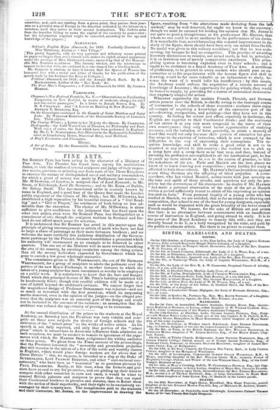At the annual distribution of the prizes to the students
at the Royal Academy, on Saturday last, the President was very voluble and ener- getic on those sore subjects the rivalry of foreign schools and the strictures of the " minor press " on the works of native artists. As his speech is not fully reported, and only that portion of the " minor press" which is subservient to Academic influences finds admission on such occasions, we must be content to remain in ignorance of the argu- ments with which Sir MARTIN SHEE enlightened his willing audience On these points. We glean from the Times account of the proceedings, that the President lamented the " unworthy and groundless prejudice that still remains in the minds of a few of the noble and wealthy classes in England, which would place foreign modern art far above that of Great Britain ": this, we suppose, is intended as a slap at the Duke of SUTHERLAND, Lord FRANCIS EGERTON, and other " anti-national con- noisseurs," who have been so " unnatural" as to purchase pictures by Piot. DELAROCHE. Really, at this time, when the farmers and gra- ziers have ceased to cry for protection, and are girding up their loins to compete with other countries in corn and oxen, it would be wiser to counsel British painters and sculptors to prove that they can equal their Continental brethren in pictures and statutes, than to flatter them with the notion of their superiority, and their right to be exclusively en- couraged by their countrymen. The compliments paid to the students and their instructor, Mr. Jokes, on the improvement in drawing the figure, resulting from " the alterations made deviating from the idle method," may be well deserved, for aught we know to the contrary ; though we must be excused for holding the opinion that Mr. JONES is not quite so good a draughtsman as his predecessor Mr. HILTON, than whom no one could be more assiduous in the performance of his duties. It is remarkable that, notwithstanding this vaunted improvement in the study of the figure, there should have been only one model from the life. No medal was given to this solitary candidate ; not that he was unde- serving, but because he had no competitor. This practice of awarding honorary distinctions to relative, not actual merit, is bad in principle : it is an invidious test of merely comparative excellence. This prize. giving system is becoming exploded even in boys' schools ; and it ought to be abolished in a Royal Academy of Fine Arts. A certificate of proficiency, to be granted to every student who should pass an ex- amination as to his acquaintance with the human figure and skill in drawing, would be far more valuable as an inducement to study, be- cause the want of it would infer his insufficiency : by this means, the Academy could enforce the acquisition of a certain amount of knowledge of Anatomy ; the opportunity for gaining which, they would be bound to supply, by providing for a course of anatomical demonstra- tion expressly adapted for artists. Whatever superiority the modern French, Flemish, and German artists possess over the British, is chiefly owing to the thorough course of instruction in the schools of those countries : students there enjoy advantages of acquiring a knowledge of the executive part of the art—drawing, composition, and painting—that they have not in this country. In feeling for colour and effect, especially in landscape, the English are superior to their Continental rivals ; and the sentiment of our artists is at any rate more congenial to the tastes of their own countrymen: they only want better opportunities of studying anatomy, and the imitation of form generally, to attain a mastery of hand that would not only increase their powers of execution but give free scope to the exercise of invention, which is now cramped by the difficulties in the way of expressing their conceptions. The re- quisite knowledge and skill to make a good artist is not to be acquired at any school in this country : the student has to pick up a scrap here and a scrap there as he best may, and then, instead of pursuing his profession accomplished in all the mechanical part, he has to patch up these shreds as he can in the course of practice, to hide the nakedness of his art. Paris and Munich are the best places we know of to learn drawing and composition : every facility for study is afforded in both those schools. Mr. HAYDON'S furious invectives against every thing German are the offspring of blind prejudice. A corre- spondent, who has visited Munich, animadverts with just severity on the tone and spirit of those attacks, and questions not only the pro- priety but the correctness of his statements: he doubts if Mr. HAYDON " has made a personal observation of the state of the art at Munich within a period sufficiently recent to admit of his expressing an opinion founded on facts." From personal inquiry of a young artist who has studied at Munich, we are satisfied, that so far as relates to drawing and composition, that school is one of the best for young designers, especially such as would be disgusted with the gross brutality of the lower class of French students. We lament, for the sake of British art and artists that there is no alternative between contentment with an insufficient course of instruction in England, and going abroad to study. It is in the power of the Royal Academy to remedy this evil ; and they are morally bound to do it, as a body recognized by the state, and paid by the public to educate artists. But there is no power to compel them.


























 Previous page
Previous page